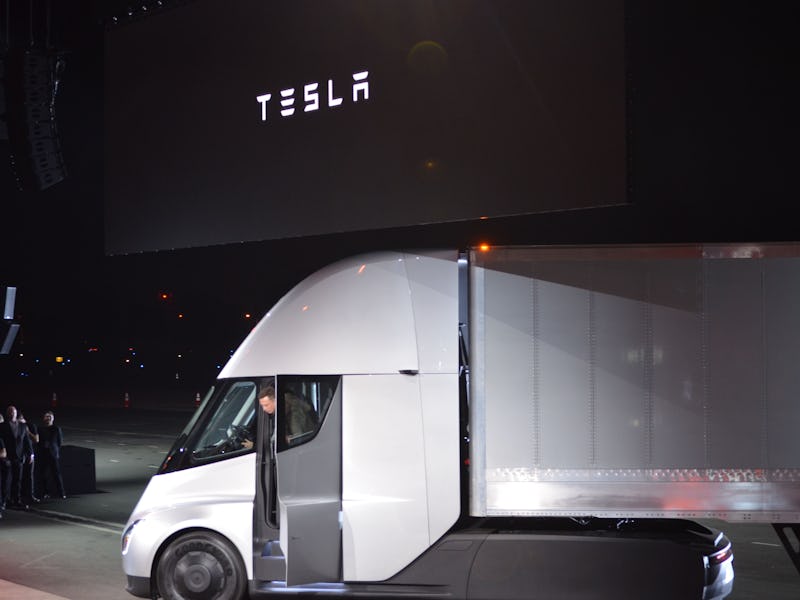Tesla: Semis are getting ready for massive production upswing, Musk says
The Tesla Semi was thought to be a long-term project, perhaps debuting in the next few years. No longer.

Tesla is going big. Earlier this week, CEO Elon Musk alerted his staff that the company would be making its Tesla Semi commercial truck a larger part of its business, bringing the trucks to “volume production.”
In an email first reported by Reuters, Musk didn’t mention a start date for the ramping up. But the news was enough to send Tesla’s stock past $1,000, a bump amidst some experts moving the stock from a “buy” to a “hold.”
The Tesla Semi, first introduced in 2019, is the company’s entry into the world of big rigs. The company had been working on the project for years before its release date, with Musk saying as far back as November 2017, when he told a crowd it would “ride like a sports car.”
In this lead up, Tesla was selling small, limited batches of Semis—100 to PepsiCo here, 45 to Walmart there. But these purchases by big players in trucking made some noise, intrigued by its two variants: a 300-mile range Semi starting at $150,000 and, most interestingly, a 500-mile range for $180,000.
While that’s around half what a diesel truck can do on a full tank—drivers can hit 600 miles in a single day—it’s still far further than the truck’s long haul electric competition. Freightliner’s eCascadia, for example, advertises 250 miles.
The company was thought to be delaying the Semi, with Musk noting on a January 2020 earnings call that it required a tremendous amount of resources in terms of batteries, and the company was focused on its Model Y and Model 3s.
The jump into volume production, confirmed by Musk with a “yes” on Twitter, could be spurred by another of Musk’s competitors: Nikola Motors, which wants to use hydrogen fuel cells to power the long rides. Nikola’s CEO, Trever Milton, has gone on a recent charm offensive in the media, hyping up the company’s debut on the NASDAQ stock exchange. The company’s website advertises long-haul truck mileage surpassing Tesla, claiming it can get up to 750 miles on a single charge.
Art for a Nikola truck, the Nikola Two.
While Milton has gone out of his way to praise Musk, recently tweeting “@elonmusk is almost unstoppable and I love it. It's Nikola and Tesla battling to stop emissions.” the frequent fighter has not seen any reason to return the favor.
Using his weapon of choice, Twitter, Musk has repeatedly gone after the hydrogen fuel cell technology at the core of Nikola’s vehicles. “Fuel cells = fool sells,” he said in a recent Twitter thread, which also shared a video from 2015 in which he critiques the technology. He would later go on to call the technology “staggeringly dumb.”
Fool sells, get it?
The Inverse Analysis:
Musk relishes in tearing a competitor to shreds, especially when he can get a chance to out-nerd them. And in between Milton’s kind words, it’s clear that he is trying a classic upstart technique: if you can lure a bigger fish into a fight, from afar people will consider the two equal. Feuds aside, betting on Tesla Semis is a calculated risk for Musk. On one hand, the purchases show there is already proven interest in the product.
But on the other, there is still the fact that diesel can outperform an electric vehicle in this capacity, and industry analysts suspect it will be another 4-5 years or so before electric vehicles can make any dent in the industry. Time will tell if the early interest can translate into serious sales.